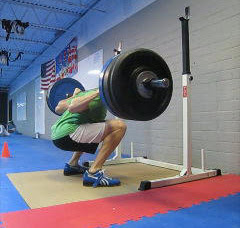As I mentioned in my Eating Simple post, I made some other pretty dramatic lifestyle changes 6 months ago besides switching the content of my diet to strictly paleo food. One of these changes was adopting a new eating schedule; I started intermittent fasting. What this means is that I started compressing my eating window, leaving 15-19 hours between my last and first meal. If I ate my last meal at 2pm, I wouldn't eat again until at least 5am the next morning. Why would anyone want to do this? Good question.
Scientists have known for years that caloric restriction (aka eating less) produces a plethora of health benefits, including lowered cholesterol, fasting glucose, and blood pressure. Studies on animals have even shown lifespan extension through caloric restriction. The problem is that the level of caloric restriction necessary to produce these benefits is difficult to implement long-term, resulting in increased irritability and depression. Restricting caloric intake also threatens to place the body in a catabolic state, promoting the degeneration of muscle tissue, including the heart. Gaining muscle in a catabolic state is next to impossible, and exercise is out of the question, because caloric restriction doesn't provide enough calories to support high levels of activity.
Fortunately, one can gain the benefits of caloric restriction through intermittent fasting, without having to restrict caloric intake. The landmark studies on IF were performed on animals, mostly rats and mice, in which they were divided into three groups: those that were fed ad libitum, those who ate a calorically restricted diet, and those that alternated between eating and fasting days. Results from these studies showed that the rats/mice that alternated between eating and fasting days ended up eating just as much as their ad libitum counterparts, but procured all of the health benefits that the caloric restriction group did. A few studies have been performed on humans, and the results look promising:
Effect of intermittent fasting and refeeding on insulin action in healthy men
Neuroprotective potential of the Bahadori leanness program: A "mini-fast with exercise" strategy.
Effects of intermittent fasting on serum lipid levels, coagulation status and plasma homocysteine levels.
My own experience with IF has been great. When I'm following an IF eating schedule, I have more energy, sleep better, and have reduced cravings compared to when I'm not IFing. I also notice that it's easier to lean out when I'm IFing, and I perform better in workouts. I've never found the eating schedule difficult to maintain, as long as I make it through the initial 2-3 days.
If you think about this from an evolutionary perspective, IF was probably the way Paleolithic man ate. Society has taught us that we should be eating 3 meals/day. Current nutritional science preaches the 5 small meals throughout the day dogma, leaving no more than 4 hours between each meal. Animals in the wild, particularly carnivorous animals, don’t eat this way. They eat when they kill, and I would think that Paleolithic man did the same. I would think that a day in the life of Paleolithic man would look something like this: hunt down and kill animal (exercise), gorge on animal (post-workout meal), sleep, repeat when hungry. Data gathered from humans still living in non-Westernized cultures in the last century supports this theory. The theory behind the Paleo diet is that it is the optimal diet for us today because it is the diet we were molded by the forces of natural selection to perform best on. If you believe that, then you should probably believe that a Paleolithic eating schedule is also optimal.
Thursday, December 28, 2006
Subscribe to:
Post Comments (Atom)


2 comments:
Interesting. Have you had any changes in body comp since this post (assuming you are still IFing)?
Yes, definitely. I've always had a layer of fat around my mid section that I couldn't get rid of, which quickly disappeared after only a week of IFing. Now, anytime I let my nutrition slip for a few days, I know I can regain my footing quickly by IFing.
Post a Comment